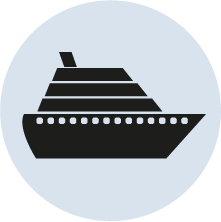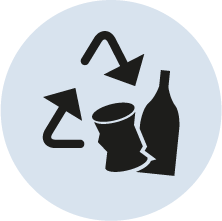What can I do?
Travel responsibly

Tourism is a big sector in the region and when traveling, you can choose cruise companies that prioritize sustainable choices. There are many eco-friendly options for businesses, such as greener fuels and careful disposing of all wastewaters in ports.
You can demand ecological options also when selecting a hotel or a beach restaurant.
More reading: Responsible shipping in the Baltic Sea (BSAG)
Don’t waste

When boating on your own, always collect your trash and recycle them appropriately. Wastewaters can be left at ports responsibly. Consider also avoiding traditional anti-fouling paints in your leisure boat.
When enjoying a day at the beach, don’t litter – not even cigarette butts! Pack your food in reusable containers and try to minimize your waste.
More reading: Eco-friendly paint most effective against fouling on ships and boats
Tell others

Shipping has great impact not just to marine environments but also to climate change. We can make a difference by saying out loud that these things really matter for us.
Tell people about the Baltic Sea – let your friends know about its beauty and problems. Share your knowledge with your friends and family.
More reading: Baltic Sea Commitments (BSAG)
Other resources
- PA Tourism reinforces sustainable tourism development in the Baltic Sea Region (EU Strategy for the Baltic Region)
- Sustainable Tourism in the Baltic Sea Region (Uppsala University self-paced online course)
What is HELCOM doing about it?
The HELCOM Maritime Working Group works to prevent any pollution from ships – including deliberate operational discharges as well as accidental pollution. The group works closely together with other international bodies such as the International Maritime Organization (IMO) to ensure that international measures are properly applied and implemented in the Baltic or the Regional Seas Programme (RSP) and the Global Programme of Action for the Protection of the Marine Environment from Land-Based Activities (GPA) under UNEP to address the problem of marine litter both at regional as well as global level.
Further reading
HELCOM Thematic assessment of economic and social analyses 2016-2021
